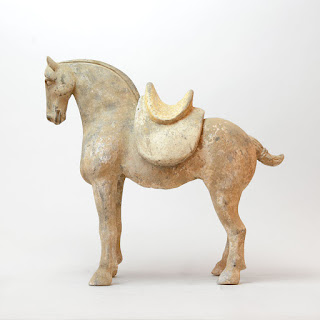|
Circa
|
618 AD to 906 AD
|
|
Dimensions
|
14.25″ (36.2cm) high
|
|
Medium
|
Terracotta
|
|
Origin
|
China
|
The great influence of the horse throughout the history of China cannot be underestimated.
In fact, the ancient unification of the Chinese Empire was due in large part to
the horse. Their rapid mobility allowed for quick communication between far
away provinces. Likewise, the military role of horses aided in the conquest and
submission of distant lands. The need to import stronger, faster steeds from
Central Asia (as opposed to the native Mongol pony) led to the creation of the
Silk Road. The importance of the horse in the history and culture of China can
be viewed, in part, through the artistic legacy of this great civilization. In
sculpture, painting, and literature, horses were glorified and revered,
believed to be relatives of dragons, a theory reflecting their sacred status
within society. During the Tang Dynasty, the adoration of the horse can be seen
through their burial art. Horse models excavated from mausoleums of the period
are among the most splendid and easily recognizable works of Chinese art. This
impressive sculpture of a horse still retains much of its original white
pigment in tact. However, even more impressive, is the removable saddle that
graces his back. Painted yellow, this saddle may have once supported a rider
who is now lost to us. This gorgeous sculpture is a testament to the admiration
and adoration the Chinese had for this marvelous creatures. Although they were
an integral part in the expansion and defense of the empire, they were equally
regarded for their beauty and grace as revealed by this sculpture




No hay comentarios:
Publicar un comentario